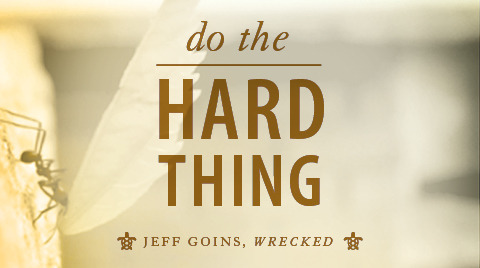Jeff Goins's Blog, page 92
July 30, 2012
Everyone Has a Story to Tell
My dad introduced me to storytelling. When I was a kid, every night he would tell me an anecdote from his childhood. I was fascinated with the tales of him and his friend Marty, causing some kind of mischief.

Photo credit: Steph Connors
I remember saying at one point, “Dad, you have some great stories. I’ll never have stories as good as yours.”
But would laugh and then reply confidently, “Sure you will. You’ll have even better stories that you’ll tell to your son.” He reminded me that everyone has a story to tell; they just don’t always realize it.
I wondered if it could be true, that I would one day have stories better than my dad’s. With his tales of UFO sightings and Walter Payton autographs, it seemed unlikely.
My first big story
It was my freshmen year of college when the theme of storytelling re-emerged in my life. My dad gave me a journal on my 19th birthday, encouraging me to fill it with rich stories. And that I did.
After a girl broke off an engagement to date me and my whole fraternity went up in arms over the issue — all within two weeks before the beginning of summer break — a friend pointed out, “Dude, you gotta write that down. It’s a great story.”
Maybe it wasn’t the most moral or inspirational piece of life experience I could ever share with my offspring, but the guy had a point: It was one heck of a story.
Over the next couple years, I realized something:
Around every corner there is a great story waiting to be discovered, lived, and retold. And people are longing to hear it.
The power of stories
Nothing is so warm and inviting, yet so challenging and poignant, as a powerful story, told well.
Stories are written to be shared, and it is our responsibility to retell those that we witness — not only for our own sake, but for the benefit of others. Stories change people. They shape entire cultures.
After traveling through European hostels, visiting churches in Latin America, and staying in homes throughout North America, I’ve conceded to my dad’s prophetic statement. Maybe I have a story or two to tell my kids. Don’t we all?
So what’s yours story to tell? Take a few lines in the comments section to share it.
Here are some links to helpful resources on storytelling:
The Short Story Website
Digital Storyteller [Mitch Joel]
On Storytelling: Interview with Donald Miller
*Photo credit: Steph Connors
You just finished reading Everyone Has a Story to Tell! Consider leaving a comment!
Have you been WRECKED?

July 28, 2012
A Call to Live the Life You’re Afraid of (Wrecked Excerpt)
Not too long ago, my wife and I attended a concert. We saw the Civil Wars play at the Ryman Auditorium, one of our favorite venues in Nashville. It was our anniversary, and we knew of no better way to spend it than seeing one of our favorite bands.
Little did I know I was going to get a crash course in sociology and the broken condition of humanity.
“I’m sure someone will help you.”
For every show at the Ryman, a local printer does a special run of posters that are available only the night of the concert. They usually sell out. We have an entire collection of them in our house, all from various concerts we’ve seen over the years, each represent ing a unique memory.
That particular night, we were excited about getting the print because it had the date on it — our date, the day we were married. There was just one problem: they gave away the last poster to the man standing in line in front of me.
No problem, I thought. I’ll just offer to buy it from him. He wasn’t interested. Nor were the twenty-five other people I asked. Each time, I would tell them the same sad story: it was our anniversary.
Then I would ask them, with a little manipulation, if they were sure they didn’t want to sell the print. Two dozen people later, I still had no poster. But something strange happened during each rejection. Here’s how each went down:
Me: “Hi. Can I buy that print off of you?”
Them: “Nah . . .” (They would say this looking at me like I was crazy.)
Me: “Okay, I understand. No problem. It’s just that—well, it’s our anniversary.” At this point, their eyes would get big. Their grip on the poster would loosen for a moment, and my heart would race. They would look at me with compassion and say softly, “Oh. I’m so sorry.” I would nod and wait, expectantly.
This was followed by an awkward pause in which I assumed they were trying to decide. I would look at them, and they would stare back at me. Then they’d pause, glance at their poster, and turn back to me without making eye contact to say, “Keep asking around. I’m sure someone will help you.”
That was the phrase that killed me.
Every person told me a version of this, each time with the same sincerity. I honestly believed they meant it. But the more this happened the more hopeless I grew. It seemed everyone was saying,
I’m sure someone will do the right thing. It’s just not me.
Isn’t this how life is?
We always assume someone else will come to the rescue, but it’s never us. Surely somebody will have the decency to be the hero. Right? It doesn’t work like that. Not when everyone assumes someone else will do the right thing.
I didn’t fault those people for not giving me the poster — that was their right. What was puzzling was how they struggled with their consciences before saying no. Only a few flat-out refused. Most just stood there for a moment, puzzled. They would say sorry, that they really wanted to help, and they encouraged me to not give up.
It was as if they wanted to give it to me but were afraid. That’s what frustrated me.
I wanted to say, “Yes, someone can help. You can!” But I didn’t. I kept asking around, kept getting rejected and feeling depressed the more I talked with people.
It wasn’t until the encore of the show that a young woman agreed to sell me her print. At that point, I was incredulous. We had spoken during the intermission, and she struggled like the others to give up the poster. However, she told me to see her before we left.
During the last song, I looked up a few rows, hoping to catch her eye as the band thanked the roaring audience. She finally looked down and smiled at me. I raised my eyebrows in an inaudible question, and she nodded. I couldn’t believe it; I had all but given up.
When I handed my wife the print, she was flabbergasted. In fact, she didn’t want to receive it. The gesture was too generous, too surprising. And that’s what made it beautiful.
I know we’re only talking about a poster here — nothing life changing. But at the time, it felt like a lot more than that. Maybe it was. Maybe it was a microcosm of humanity in all its grisliness and glory.
A wake-up call
I’m no different from those two dozen people I met that night. I have my own little trinkets I’d rather not give up.
I have comforts and addictions I won’t let go of. I’m more selfish than I’d like to admit, bent on my own desires and needs more than those of others. Whenever possible, I defer responsibility. I avoid what is right and protect my own interests.
If we’re honest, many of us are like this. It’s human nature to look after your own survival first, even when it’s not a matter of life and death. We can’t help it.
We keep scrambling for scraps from the table, until one of us is finally courageous enough to do what that young woman did: to obey our conscience. To stand up and do what is right.
(Note: What made this the “right” thing to do wasn’t that I deserved the poster — I didn’t. What made it it right was that she obeyed her conscience.)
All over the world, ordinary people are making brave choices like helping beggars and moving to foreign countries. They’re listening to that still, small voice whispering, “Life is not about you.”
This is the most important life change that will ever happen to you, if you let it. I’ve experienced it myself — at least in part — and it has been anything but comfortable.
It’s been ugly and hard. I’ve had to give up my rights and expectations so I could find the life I was longing for. And it looked nothing like what I expected.
The strange part? I wouldn’t trade it for the world. I couldn’t. I’ve been changed from the inside out. I’m no longer the same me. All because of a choice that defined me and continues to shape how I view the world.
Today, I challenge you to do two things:
Recall a hard choice you once made. This is something that caused you to step out of your comfort zone, that allowed you to move past selfishness and embrace the fullness of life. Remember that experience and the thrill it gave you to help someone in need.
Consider a sacrificial decision you’ve yet to make. Think of one you may be avoiding or procrastinating. Whatever your conscience is saying, listen to it. Be courageous, and do the hard thing.
Lastly, I want to implore you to not be one of those people saying, “I’m sure somebody will help you.” I hope you take time today to respond to that voice inside of you, prompting you to give more and get less.
I hope you realize the “somebody” we’re all deferring to (to do the right thing) is you. (You might want to tweet that.)
To download the first chapter and get on the list to be notified when the book comes out (so you don’t miss the free stuff), click here.
You just finished reading A Call to Live the Life You're Afraid of (Wrecked Excerpt)! Consider leaving a comment!
Have you been WRECKED?

July 27, 2012
When It Feels Like Everything is Falling Apart
I couldn’t find the top metal piece to one of our floor lamps this morning.
“Where is it?” my wife asks. I shake my head, knowing I took it off when we moved it, but not knowing where I put it. We’ve been living in our home for nine months now, and it still feels like we’re moving.

Photo credit: Karen Burns (Creative Commons)
“I don’t know,” I say, glancing at the coffee table full of clutter: papers, makeup, deodorant, a few computer cables, and a laptop.
“Why wouldn’t you just put it back on?”
It’s a little screw that holds the lamp shade on. We pulled it off the other day when we were re-arranging the living room. The smart place to store it would have been on the lamp, once the shade was removed.
“I don’t know,” I say. “Sorry.” I am saying this word a lot lately.
That screw is gone forever, beyond redemption.
We will never get it back. I am sure of it. That’s the way life has been these days.
The other night, while registering for gifts at Babies-R-Us, I treated my wife to dinner. The next day, I realized I had left my wallet at the restaurant.
Yesterday, I had to drive across town back to the Olive Garden to convince the hostess it was, indeed, my wallet — without being able to show her my ID.
I reluctantly gave her my credit card, and she disappeared in the back room for a few minutes. When another woman emerged and handed me the wallet, I noticed my driver’s license was missing. Great. Just great.
Just when I thought nothing else could go wrong…
* * *
If you haven’t already done so, go read the rest of the story here.
Further thoughts on falling apart
Life is hard. I wish it weren’t, but it is. And through those difficulties, we learn some of the best lessons about who we are and what our time here on earth is about.
I’ve had my fair share of days when it feels like everything was going wrong, like I couldn’t do anything right. In fact, I still have them.
When those days come, it’s not easy to get through them. But in those darkest moments, when it feels like all is lost — your business is failing, your marriage is over, the pain will never end — there’s still hope. Still a reason to believe in something better.
I don’t know want to sound overly optimistic here; I know things can suck sometimes. But I also know there’s a deeper story being told, a redemptive one of grace and second chances.
And without it, I don’t know how I’d make it through another day.
How do you make it through days when it feels like everything is going wrong? Share in the comments. And don’t forget to read the original piece.
*Photo credit: Karen Burns (Creative Commons)
You just finished reading When It Feels Like Everything is Falling Apart! Consider leaving a comment!
Have you been WRECKED?

July 25, 2012
Warning: Writing Like This Will Make Your Readers Cry
Can I ask you a question? Since I can’t really hear you, I’m going to, anyway: Why do you write?
To inspire? To critique, teach, or motivate? To remember (or forget)? For self-expression? Because you have a fire burning in your bones, and you simply must?
Out of all the perfectly legitimate reasons that you could write, I imagine you don’t do it to merely entertain. No, you want to touch your readers, move them in some way. Even cause them to cry.

Photo credit: Creative Donkey (Creative Commons)
Shattering the frozen sea
Frank Kafka once said, ”A book must be the ax for the frozen sea within us.”
Be honest. You dream about your writing having that affect on someone, don’t you? Because words have had that affect on you.
The frozen sea inside of you has been shattered by stories, truths, ideas, and turns of phrase so astounding that you had no words to respond or even tell someone what it meant to you. Isn’t that why you want to write?
So, how do you write words that will move people, and potentially even play a part in breaking the frozen sea inside of them? It’s actually quite simple:
You write what moves you.
Except that part is not always easy. Because in order to write what moves you, you will have to visit your pain. Your fear. Your weaknesses. Your nightmares and demons. The skeletons in your closet and the horrific possibility of self-disclosure, even if veiled in stories and themes.
Because, as you well know, that’s where the frozen sea inside of you is. If you are ever going to crack the ice of another person’s soul, you have to be brave enough to go first. To be a witness. A testimony. An example.
You have to go first
If you love your reader, you will go first. You have to lead them on this journey. To show them how and why it’s important.
There is enough fluffy, meaningless drivel on paper to fill the Marianas Trench. So don’t add to it. Write something that matters. And write it with conviction:
Write about the truths and ideas that are so astonishing you can hardly believe them.
Write the story that keeps you awake, tossing and turning at night because it echoes the ache in your soul.
Write that memoir, and include the parts that you are terrified of putting on paper, because it will remind you that they are real. (Some may no doubt need the support of a friend, therapist, or pastor for this.)
Whatever it is, write about those things that punch you in the throat and stir your insides.
Because if it moves you — if it raises a lump in your throat as you type, it will move someone else.
It might just give them the hope that you’ve been given by other writers, with their words and stories that have inspired and reminded you that you are not alone. Aren’t you glad they went first?
As I was writing my first novel, there were many times where tissues had to guard my keyboard from falling tears. The story I was writing moved me and, thankfully, it has gone on to move others.
Such is the inexplicable magic of words, and I am in awe of the weight they can carry.
This is not just for the reader
Oh, and one more thing: Don’t believe that going first is only a gift to your reader.
It is first a gift for you — and a very meaningful one at that.
We all need to go to our frozen sea, because seas were not meant to be frozen. They are meant to thrash about with life.
So, what are you waiting for? Go find your ax. And get to work.
What books have helped break the frozen sea inside of you? Share in the comments.
Be sure to check out Brandon’s book while it’s free on Amazon this week. This offer expires July 29, 2012. Get it here.
*Photo credit: Creative Donkey (Creative Commons)
You just finished reading Warning: Writing Like This Will Make Your Readers Cry! Consider leaving a comment!
Have you been WRECKED?

July 23, 2012
3 Steps to Building a Killer Tribe
Here’s a quick rehash (with some edits) of an old post that deserves reposting:
We’ve talked before about why you need to find your tribe — a unique group of fans, friends, and followers who resonate with your worldview. This is done through a blog, a radio program, or even a public speaking platform.
The medium is irrelevant; what matters is the trust and relationship you establish with people. The hard part isn’t defining the message; it’s creating a community of individuals who want to hear what you have to say.

Photo credit: Rachel D (Creative Commons)
If you asked Seth Godin how to build an audience, he’d say you need a message that is personal, relevant, and anticipated. So what does that actually look like? Here are three important steps to building a killer tribe:
Step 1: Be personal
If you want to reach other human beings, act like one. Simple, right? Hardly.
A lot of people turn into robots when they get on the Internet or step into the spotlight. Either they become complete jerks or turn into formal ambassadors of snobbery. So be different:
Talk like a real person (even if it means breaking a few grammar rules),
Be accessible (as an exercise, try answering as many emails as possible as soon as they come in).
Show your scars (don’t be afraid to be a little vulnerable).
You don’t have to air all your dirty laundry or expose ever personal aspect of your life to accomplish this. Just don’t be someone you’re not. Be you — and amazing stuff will happen.
I like what Chris Brogan says about this:
Your goal is to move your ideas through a platform to encourage a human interaction.
People like connecting with other people. It’s human nature. If you allow your fans and readers to feel comfortable, they’ll open up to you and start feeling comfortable. As they do, you’ll earn permission to speak into their lives.
Step 2: Make your message relevant
People don’t care about what matters to you; they care about what matters to them. If you want to attract an audience, you need to stop thinking about yourself and start thinking about how you can help people.
Godin says this about tribes:
[W]hat people really want is the ability to connect to each other…
A tribe helps like-minded people find each other; it “gives them a story tell and something to talk about.” So how do you build one intentionally, instead of merely stumbling upon these connections?
Here’s an idea: be generous. Consider the following scenarios:
A newbie blogger gives away an eBook he could charge for in exchange for your email address.
That edgy, indie band offers a complimentary download of their new album for a week to help promote it to a larger audience.
An up-and-coming cartoonist who’s yet to make the big-time releases a daily comic on his blog for all to see, with no strings attached.
Over-the-top generosity is the best marketing you’ll ever do. And nothing builds an audience more quickly.
All of this, of course, is not free. It costs the artist something — a lot, actually. But in return, it earns her something even more valuable than money: trust.
When you are willing to help people get what they want, they’ll return the favor. (Caveat: This is NOT why you do this, but it’s a nice byproduct.)
So what does this look like for you? How do you become relevant in a world full of noise? Start by finding a niche with a worldview, and speak directly to them. Exclude all others and focus on making that group feel special.
Step 3: Ensure your message is anticipated
Every day, someone delivers a newspaper to my house. I have never asked for it, paid money for it, or read it. Not once. Nonetheless, day after day, someone feels compelled to drop a little plastic bag full of today’s news on my driveway.
The mindset of the person delivering the paper is this: If we show up and interrupt you long enough, eventually you’ll have to pay attention. Try again. This is called SPAM, and it doesn’t work. Not anymore.
If people aren’t anticipating your message, they’ll just tune you out. (Click here to tweet that.)
You have to first earn permission, speak directly to the tribe, and deliver what you promise. Only then will we care what you have to say or sell.
This can happen as frequently or infrequently as you want. Show up when you say you will — no more, no less. If expectations change, clearly communicate them and give people an easy way to opt out for when they lose interest.
Contrast the newspaper I get with the Amazon order I just made. I can’t wait for that package to arrive. Any subscription-based service or important message is like this: It’s expected, and as such, taken seriously.
What this means for you
If you do the hard work of respecting people’s time, you’ll earn the right to speak to them. You may find that some are no longer tuning you out, but showing up, eager to hear what you have to say. This is the paradox:
When you make your platform about other people, they’ll make it about you.
Respect begets respect. Generosity is often reciprocated. Being resourceful is a great attention-getter. Honor these principles, and you’ll never have to worry about getting someone’s attention again.
Have you found your tribe? Share in the comments.
Special Offer: My friend Bryan Allain hosts a conference called Killer Tribes and just released the sessions on audio. You can hear nine speakers (including me) talk on tribe-building (plus bonus content) when you grab one of these great packages. Get it before the price doubles after tomorrow.
*Photo credit: Rachel D (Creative Commons)
Disclosure: Some of the above links are affiliate links.

July 22, 2012
How to Get Your Spouse to Support Your Dream
It’s impossible to chase a dream without fellow “believers.” When our friends and family believe in us, they propel us forward. They give us the strength we need to push through the self-doubt and fatigue.

Photo credit: ComeliMare (Creative Commons)
This is true for getting started with writing, launching a business, or pursuing any passion.
For those of us who are married, we depend on our spouses more than anyone else. Without their support, we make little progress toward our goals. We don’t become all we can be without their assistance.
So how do we enlist our spouses in our life’s work — especially when they’re hesitant to help or slow to understand?
Share your needs
Unless your spouse is a fellow writer or artist or architect (fill in the blank with your vocation), she isn’t going to understand your needs. So help her out:
Be honest and realistic about your schedule.
Share the details of when and where you work best.
Set reasonable expectations, and ask for support in reaching your goals.
When your spouse knows what you need, he is more able to help you make your dream a reality.
I found myself regularly getting frustrated when my husband Erv would interrupt me or ask questions while I was writing. The break in concentration often derailed me and I’d get angry.
In return, he felt unappreciated and ignored. This did not help our marriage or my writing — which is about marriage, ironically.
Once I shared how I work best when I have large chunks of uninterrupted time, Erv was able to provide it for me. We created specific windows of time for my writing and he planned his own work and other activities during that time.
The change in expectations made a huge difference in our relationship.
Stick to your limits
Once you express your needs and establish a schedule that works for you both, stick to your word. It’s easy to push the envelope and go beyond the time-frame you agreed to. This is a daily temptation for me.
When I’m writing, I can take up to an hour to simply focus. Once I get rolling, I don’t want to stop.
I’m obsessive about finishing and thrive on goals and deadlines. Whatever target I’ve set for the day, I’m determined to reach it before my time runs out.
If you don’t have a family or other commitments, this works out fine. But when you have a spouse and three kids waiting for you to re-engage, you need to stop.
It’s tough to put on the breaks once the creative juices are flowing, but sticking to the limits you agreed on is essential to a healthy relationship.
You honor your spouse and your marriage by keeping your word.
Stay humble and serve
When your spouse supports your needs and gives you room to write or make crafts or become an entrepreneur, you’ll start to experience some success.
This is wonderful and worth celebrating (every milestone reached deserves a good dance party). But don’t forget how you arrived at this achievement.
Without the sacrifices of your spouse, success would not be possible. Her belief in you when you felt like you were failing is indispensable. Recognize the critical role she plays in your progress.
Every moment our spouses free us up to pursue our dreams, they are serving us. Let’s be quick to serve them in return:
What are their dreams and goals?
How can you support those dreams and help make them happen?
Do they know how much we believe in them?
Without my husband Erv, all my success wouldn’t have been possible. I’m thankful to have someone who supports my passion and makes this incredible adventure possible.
How have you enlisted the support of a spouse? Has his/her belief in you enabled you to succeed? Share in the comments.
*Photo credit: ComeliMare (Creative Commons)

July 19, 2012
What Freddy Krueger Knows About Blogging That You Don’t
It’s a disturbing image, isn’t it? Freddy Krueger reaching into your dreams and wreaking havoc on your life? Why, then, would I draw an analogy from a horror movie character to your blog?
It has a little something to do with being everywhere.

Photo credit: Allmoviephoto.com
Good horror movies do this
I don’t love those cheap horror movies that are full of guts and gore and half-naked girls running around nonsensically. But I do enjoy a good thriller that gets your blood pumping. And I’m not the only one.
So what is it about these stories that captivates us? It has to do with suspense.
Not knowing what comes next — this is why we love following a story. We want to be surprised, shocked. We want the bad guy to jump out from behind a bush or in the middle of a dark alley. It’s why we tune in in the first place.
And as a writer, communicator, or artist, you need to do the same. You need to take a page from Wes Craven’s notebook.
Start simple
So how do you do this? Begin by focusing on action words, not fluff. Make your writing move by keeping it simple and straightforward, just like a good horror flick.
No, you don’t have to pander; you just don’t need to work so hard to impress people. The best writing is transparent; it breathes.
A scary movie doesn’t have to include great dialogue or award-winning acting for you to love it. It just needs to move you. This is true for your blog, as well.
Be everywhere
As you do this — as you write words that grab people — you need to also do what Freddy does. I’m not talking about murderous rampages (skip that part); I’m suggesting you show up where people should be finding you. Where others you want to influence are.
What does that look like? Go to conferences, guest post like crazy, join forums and social networks. Do everything you can to get found. Keep trying stuff out until you find something that works for you.
If you want your writing to be read, you have to do more than write. Sure, the content is important, but it’s also a given.
If you want to impress us, you’re going to do something special. You’ll have to put yourself out there.
Special Opportunity: Today, I’m hosting a webinar with Danny Iny about this topic: fast writing and guest posting on big blogs. You’ll learn how Danny started showing up everywhere online (kinda like Freddy) and hear a little bit about his aptly-named “Write Like Freddy” course. Sign up for free here.
What other blogging and writing lessons do we learn from Freddy Krueger and horror films? Share in the comments.

July 18, 2012
A Challenge to Share a Story You Don’t Want to Tell
After I graduated from college, I traveled for a year and then took a job at a nonprofit. As a staff writer, my job was to train missionaries to blog and help them share their stories with the world.
Every day, I would read inspiring tales of how other people were changing the world, and they would inspire and frustrate me. I realized it wasn’t enough to tell someone else’s story. I had to start living a remarkable one myself.

Photo credit: Michael Bentley (Creative Commons)
My personal turning point
As I shared in an earlier post, I stopped believing the stories I was telling, and this really bothered me. Something had to change.
So I began doing something different: I started hanging out with homeless people as often as possible. I cooked hotdogs for them on Saturday mornings and brought blankets on Friday nights. I listened to their stories and had the privilege of playing a part in some of them.
This changed me.
I found what I had always been searching for: meaning, purpose, and satisfaction — and in the most unlikely of places. I began to come alive and see the world differently. And I was not alone.
Where we find purpose
Turns out, this is where we often find our purpose in life. Not in the easy, but in the hard. In the difficult things that test our resolve and turn our worlds upside-down.
Life, it seems, is not about creating a purpose for yourself; it’s about finding one that’s already there.
The more I share this, the more I find others who have had similar instances of awakening.
It doesn’t matter who they are or what they do. Everywhere, there are doctors and lawyers, engineers and teachers, actors and and handymen — all discovering a call to a more meaningful life through the realization that life is not about them.
Will you be brave?
This is difficult to talk about; these are the stories we don’t want to share. They’re the ones about a car accident or death in the family, a tough bout of unemployment or unexpected loss that sent you searching for meaning — and eventually finding it.
We don’t want to go “back there,” don’t want to relive the pain. It’s just too difficult. But this is where healing and hope are found, where we find ourselves connecting to a greater narrative — in our stories.
So what does this mean for you? Well, if you can relate to this feeling, I want you to do something courageous: Tell your story. Even if you’re scared, even if you don’t want to. Do it anyway, because people need to hear it.
This is what my upcoming book, Wrecked, is about — the tough moments that shape us, the ones where you realize you’re a part of something bigger than yourself.
An invitation to share your story
In preparation for the launch of my book (which is Aug. 1, 2012), I’m inviting people to share their stories of how they got wrecked — how a broken world slammed into their comfortable lives.
Typically, these moments are unexpected. They’re unwelcome but good, ruining your small way of looking at the world and replacing it with something better.
We already have a few stories that have come in — one of a parent who lost a child to cancer, another of a man who experienced real need (and the opportunity to meet it) for the first time in Haiti — and more come in every day.
If you have had a similar experience, one that left you feeling wrecked but ultimately made you a better person, tell us about it.
Have you ever had your world turned upside-down? Share in the comments. And find out more about how you can tell your story here.
*Photo credit: Michael Bentley (Creative Commons)

July 17, 2012
Overnight Success Ain’t All It’s Cracked Up to Be
A few months ago, Amanda Lockwood appeared on The Ellen Show. Who is Amanda? Nobody special — that is, until recently. On the show, Ellen asked her viewers to follow her guest on Twitter. And many did just that.

Ellen welcomes Amanda Lockwood to the show (Courtesy of KCTV).
Amanda went from having 60 followers to 12,000 in a few days to well over 20,000 in a matter of months, a respectable amount of fans for any blogger, musician, or public speaker.
And she did it without having to do much work at all — she just showed up.
Before the ease of online connection and social media platforms, this never would’ve happened. It couldn’t have.
Before the Internet
Before the Information Age, Amanda would’ve appeared on TV, had a quick thrill, and quickly faded away. Neither you nor I would’ve had the thought to track her down and pay attention to her… even if she did make an appearance on daytime television.
But now in a short amount of time, this young woman has reached a state of mini-celebrity that she can leverage for whatever she wants.
In what other period of history has this been possible? For someone to virtually pack a stadium without ever having to knock on a single door or do one bit of promotion?
The power of social media
This is the power of social media; it’s a testament to the potency of the Internet and a virtually-connected world. And it’s as dangerous as it is exciting.
Does this mean Amanda will be successful? That she’ll get rich and famous off of someone else’s influence? Does it mean Ellen’s fans care about what she has to say? Not necessarily.
What it does mean is that Amanda has a chance. And that’s the whole point. In this age of opportunity, we are all
out of excuses to not make our mark — even without Ellen’s help.
We’ve all been given a microphone. The real question is: Will we use it? (Click here to tweet that.)
Takeaways
Here’s what I take away from this story:
If you have influence, you have a responsibility to wield it well — to be generous and share it with someone who needs it.
If someone’s given you a shot, you still have to earn it. You still have to keep an audience’s attention and not take their trust for granted.
This is true for book endorsements and guest blog posts, as well as dating relationships and job interviews.
We all have gifts and chances. And we must treat these with the care they deserve.
When our time here on earth is done, what we have to show for it is how we used what was given us. How we took care of our gifts and chances — and how good we were at giving them away.
(Side note: A friend of mine just opened for the Beach Boys. These opportunities are everywhere.)
The real rub
In all of this, I’m left wondering — at a time when people can become famous overnight (if you know the right people), does this mean fame holds less value than before?
Does it undermine the real work of earning an audience?
No offense to Amanda, because she didn’t do anything wrong, but I’m kinda glad I’ve spent the last six years hustling to get to where she got overnight. I hope that means I don’t take it for granted.
In fact, I hope we all appreciate our respective struggles. Call me crazy, but I think they’re part of the reward.
What about you? What do you make of all this? Share in the comments.

July 16, 2012
Art Helps Us Deal with Suffering
I was having coffee with a friend the other day, and we were talking about the struggles of the creative life. The topic of art and suffering came up.

Photo credit: Christopher Macsurak (Creative Commons)
My friend is a photographer, struggling with his own need to make a living, while being true to his calling to create good art. Through the conversation, we both learned that it’s tough to be an artist. Tough, but necessary.
A call for generosity
Being an artist means to be generous. It means God has given you a gift you need to share with the world. And the world is a messed-up place. It’s hurting and confused.
The world is suffering.
Art helps us make sense of the suffering. Not by spouting off cliches or offering trite platitudes, but by speaking to that inner voice inside each of us that says,
Yes, this sucks, but there is still beauty. There is still hope for redemption.
Sometimes, life doesn’t make sense. Sometimes, there is just pain. Without explanation or reason. And that is when art serves us best — when words fail and we are numbed by what we see. When all we can do is cry.
It helps us not escape our pain but transcend it. It doesn’t give us a reason for our suffering, but it gives meaning to our lives.
The artist’s burden
The curse of the artist is that she must bear the burden of the world’s pain.
To paint a picture or write a song that soothes someone’s suffering means you have to experience their agony — to have compassion, to suffer with. How else can you speak to what they’re feeling?
To be an artist is to suffer. But not without meaning. Not without purpose. To be an artist is also to create something beautiful that can alleviate pain.
This is what great art can do:
Sit silently with a friend who is mourning.
Speak comfort and consolation without saying a word.
Sing a note that shakes a shattered soul.
Great art is transcendent; it goes beyond the moment, not by ignoring but by empathizing. It cannot undo, but it can redeem. It acknowledges the night, while reminding us that joy still comes in the morning.
How does art help you deal with suffering? Share in the comments.
*Photo credit: Christopher Macsurak (Creative Commons)





